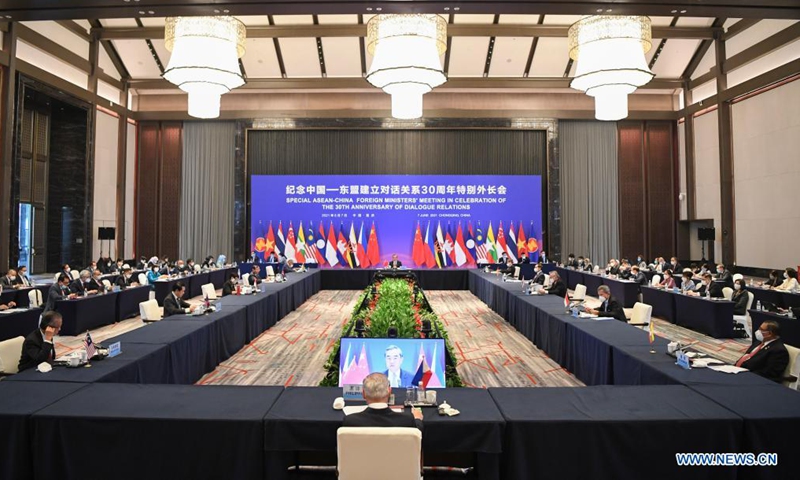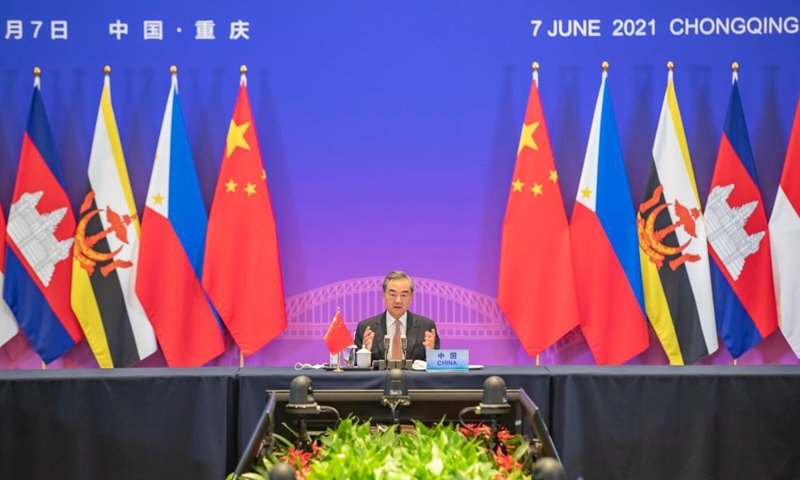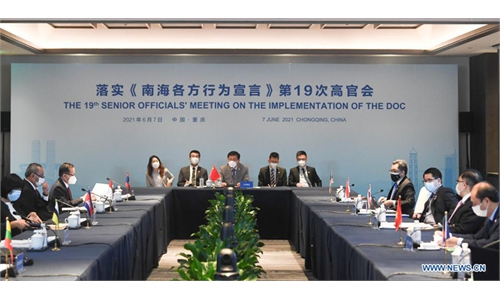China-ASEAN ties ‘most successful and dynamic’ in Asia-Pacific; FMs agree to resume S. China Sea code of conduct talks

The Special ASEAN-China Foreign Ministers' Meeting in Celebration of the 30th Anniversary of Dialogue Relations is held in Chongqing, southwest China, June 7, 2021. (Xinhua/Wang Quanchao)
China and ASEAN countries have expanded and deepened their mutual interests by properly managing differences over the past 30 years, creating the most successful example of cooperation in the Asia-Pacific region and demonstrating the mutual desire of the two sides to maintain regional peace and stability while resolutely objecting to interference by extraterritorial countries, Chinese observers said after the special foreign ministers' meeting between China and ASEAN countries on Monday.
Chinese State Councilor and Foreign Minister Wang Yi on Monday met with foreign ministers of ASEAN countries in Southwest China's Chongqing for a Special ASEAN-China Foreign Ministers' Meeting in Celebration of the 30th Anniversary of Dialogue Relations.

Chinese State Councilor and Foreign Minister Wang Yi attends the Special ASEAN-China Foreign Ministers' Meeting in Celebration of the 30th Anniversary of Dialogue Relations in Chongqing, southwest China, June 7, 2021. (Xinhua/Wang Quanchao)
In his speech, Wang spoke highly of the cooperation between the two sides over the past 30 years, and also made suggestions for the future development of China-ASEAN relations.
The two sides may explore ways to elevate China-ASEAN relations to a comprehensive strategic partnership, demonstrating the will and determination of unity and cooperation and setting a new benchmark for China-ASEAN cooperation, Wang said.
The two sides may also explore the establishment of an expert group to strengthen cooperation in vaccine research and development, production, procurement, inoculation and supervision, and work to build a regional center for vaccine production and distribution, so as to make vaccines more affordable and accessible in the region, Wang said.
Xu Liping, director of the Center for Southeast Asian Studies at the Chinese Academy of Social Sciences, told the Global Times on Tuesday that China-ASEAN relations are the most successful and dynamic partnership in the Asia-Pacific region and have created many multi-dimensional cooperation mechanisms.
We are willing to further elevate the bilateral relations to a comprehensive strategic partnership, indicating the two sides will have expanded and deepened comprehensive cooperation in the next 30 years, Xu said, noting that the direction of future development lies in digital economy, 5G, poverty alleviation, environmental protection, climate change as well as reconstructing supply chains under the Regional Comprehensive Economic Partnership (RCEP).
China and the ASEAN countries also held a senior officials' meeting on the implementation of the Declaration on the Conduct of Parties in the South China Sea (DOC) in Chongqing, agreeing to resume as soon as possible the second reading of the Single Draft Code of Conduct in the South China Sea Negotiating Text and working for the early conclusion of negotiations.
When meeting with Philippine Foreign Secretary Teodoro Locsin, Wang said China has never attached any political conditions to aiding the Philippines, nor does it have any so-called "trap."
Admitting that the development of China-Philippines relations is facing some difficulties and challenges, Wang told Locsin that the two countries should strengthen the determination against those remarks attacking and discrediting the mutually beneficial cooperation.
Saing that some differences between the two sides exist over the South China Sea issue, Locsin noted they should not affect the rising bilateral friendship and practical cooperation in various fields.
Xu said that the South China Sea is not the Caribbean Sea and should have nothing to do with extraterritorial countries. Further accelerating the negotiations on the issue showed the political determination of both sides in safeguarding the stability of the region.
"The South China Sea issue is only a difference between China and very few ASEAN countries, and attempting to make the issue a powder keg of the whole region is doomed to fail, as ASEAN countries are deeply aware that they will not achieve development without peace and stability in the South China Sea region," Xu said.
The rare offline meeting between China and ASEAN countries held amid COVID-19 was driven purely by the motivation for cooperation between the two sides, rather than the pressure or threats from the US and its allies, Xu said.
Claims by some Western media outlets that China is hosting ASEAN ministers for competing with the US were made purely out of ulterior motives and seriously underestimated the thousands of years of historical and cultural connections between China and Southeast Asian countries, Xu said.
On the Myanmar issue, Wang said that China is willing to continue to work with ASEAN countries to jointly urge all parties in Myanmar to put the interests of the people first, exercise calm and restraint and eliminate all kinds of violence, encourage all parties in Myanmar to engage in political dialogue within the constitutional and legal framework and jointly urge all countries to abide by the principles of the UN Charter and avoid unilateral sanctions and undue involvement.


